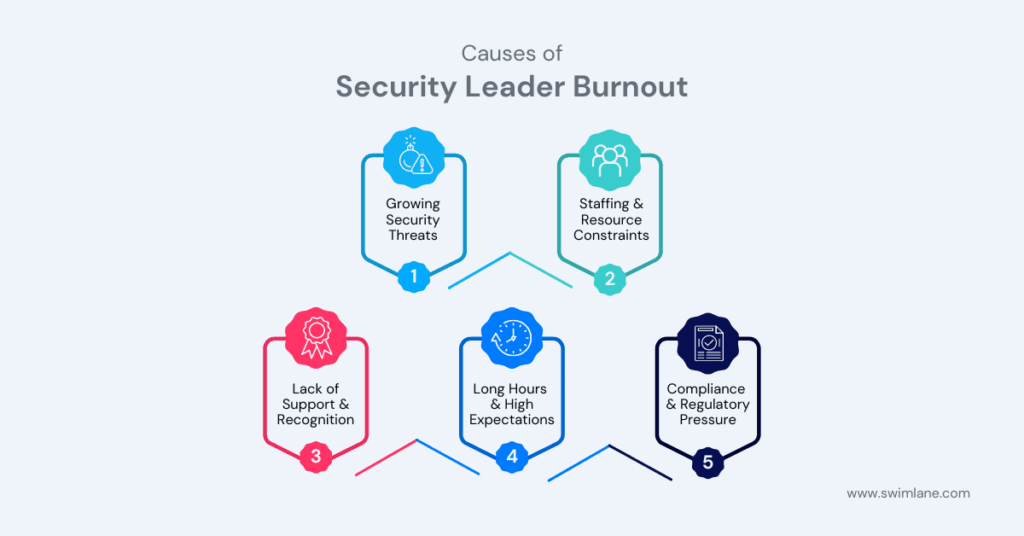Lack of staff and stressful workloads are taking a toll on security leaders. Many are leaving the industry altogether – who can blame them?
In recent years, there’s been a growing concern about cybersecurity threats and the need for businesses to ensure that their systems and data are secure. As a result, security operations teams and their leaders have become increasingly important in the corporate world. Working in the security industry doesn’t come without challenges though.
Most of intimately familiar with the recent Great Resignation, where workers left their jobs in record numbers as they re-evaluated their priorities and sought out better opportunities. Blame the pandemic, or the rise of remote work or a general desire for more fulfilling careers.
Regardless, security leaders – including CISOs, SOC Managers and Security Directors – are not immune to this trend. In fact, we’re already witnessing a new reality: the next wave of resignations will come from the cybersecurity industry.
Nearly a third of CISOs are considering quitting their jobs in the next six months.
But why are CISOs resigning, anyway? There are several reasons why this is likely to happen.
A Global Shortage of Security Professionals
First, the demand for cybersecurity professionals has skyrocketed in recent years, as more and more businesses seek to protect themselves from cyber threats. This has led to a shortage of qualified professionals in the field, which means that cybersecurity professionals have more bargaining power when it comes to negotiating their salaries and benefits.
Difficulties Highlighting the Business Value of Security
There is a growing sense of frustration among cybersecurity professionals about the challenges of proving the value of security to key stakeholders in the c-suite. Many feel that they are not given the tools and budget they need to effectively do their jobs, and they may feel that their concerns are not taken seriously by management. Many don’t have clear insight into their team’s performance as well, which makes this task even more difficult.
Continuous Job Burnout
Alert fatigue is usually a major culprit for burnout in security analysts, but the effects of burnout are felt across the security operations center. Many security leaders and CISOs find that the demands of the job take a toll on their mental and physical health, and they may decide to look for less demanding roles.
All of these factors are likely to contribute to a wave of resignations among security leaders and CISOs in the coming months and years. This could have significant implications for businesses as they struggle to find qualified professionals to replace those who have left.
What’s Causing Security Leader & CISO Burnout?
Security leaders and CISOs are responsible for ensuring the security of an organization’s digital assets and data, which can be a challenging and stressful job. Add in security teams to manage, executive expectations to meet and industry requirements to comply with. Needless to say, there are several reasons why security leaders may experience burnout:

Growing Cybersecurity Threats: The number and complexity of cybersecurity threats continue to increase, which puts a significant strain on CISOs and their teams. Security leaders are also under pressure to keep up with the latest security trends, technologies and regulations to protect their organizations from cyberattacks.
Staffing and Resource Constraints: Many organizations struggle to allocate sufficient resources, including staff, budget and technology, to support their cybersecurity programs. Security leaders may feel overworked and overwhelmed due to limited resources, which can lead to burnout.
Lack of Support and Recognition: CISOs may feel isolated and unsupported within their organizations, particularly if they are not given a seat at the executive table or if they do not receive adequate recognition for their contributions. This can contribute to feelings of burnout and frustration.
Long Hours and High Expectations: Security leaders are often expected to work long hours and be available around the clock to address security incidents and emergencies. This can take a toll on their mental health and personal life, fueling burnout even more.
Compliance and Regulatory Pressure: CISOs are responsible for ensuring that their organization complies with various regulations, such as HIPAA, PCI-DSS, and GDPR. This can be a challenging task, particularly if there are multiple regulations to follow.
Mitigate the Risk of Resignation
To address this issue, businesses must take a proactive approach to cybersecurity. This may involve investing in better resources and tools, like security automation, for their security teams. Another solution is to foster a culture that supports and values the work of cybersecurity professionals. By doing so, organizations can attract and retain high-quality talent and ensure that their systems and data are secure in the face of emerging cyber threats.
Unless great action is taken, the next great resignation is likely to come from the cybersecurity industry. Security leaders and CISOs that feel undervalued and overworked will look for better opportunities and work-life balance. Organizations will need to take steps to address this trend and ensure that they’re prepared to face the growing threats of the modern world.

Gartner: Create a SOC Target Operating Model to Drive Success
‘Security and risk management leaders often struggle to convey the business value of their security operations centers to nonsecurity leaders, resulting in reduced investment, poor collaboration and eroding support…’ — Access this Gartner SOC Operating Model report – courtesy of Swimlane.

